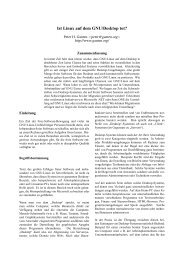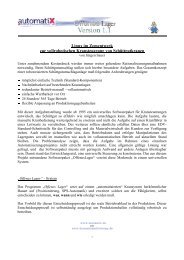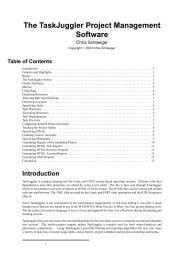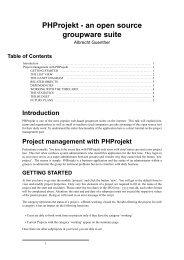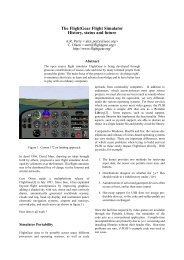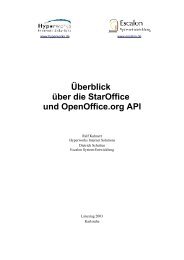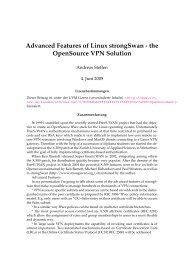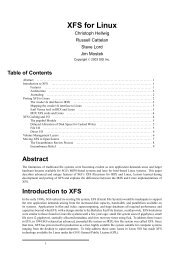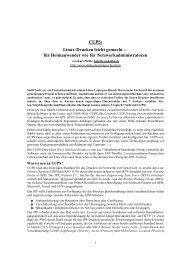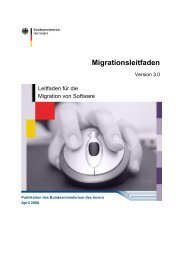Pan-hacker culture and unconventional software innovation ...
Pan-hacker culture and unconventional software innovation ...
Pan-hacker culture and unconventional software innovation ...
Create successful ePaper yourself
Turn your PDF publications into a flip-book with our unique Google optimized e-Paper software.
<strong>and</strong> Linus Torvalds have declared themselves to be pioneering '<strong>hacker</strong>s' in their<br />
publications 5. Linux is a good example of hacking evolution. Linus Torvalds began<br />
Linux as a hack; he wanted to play with Minix with a new hardware platform<br />
previously unknown by Minix. So, Linus wrote his own version of Minix. It was in<br />
1991. Then, he put it free on the Internet <strong>and</strong> a lot of people put things in it, <strong>and</strong><br />
resolved some problems. Linux is the product of <strong>hacker</strong> team-work. Being a Linux<br />
user is similar to being a <strong>hacker</strong>: the user is willing to write creative programmes <strong>and</strong><br />
to share information (source code). I would like to call this phenomenon a 'pan<strong>hacker</strong>'<br />
phenomenon. Users in the Linux community have been living with the pan<strong>hacker</strong><br />
<strong>culture</strong> since the very beginning of Linux. I want to argue that this pan-<strong>hacker</strong><br />
<strong>culture</strong> has played an important role in shaping <strong>innovation</strong> in the <strong>software</strong> industry.<br />
<strong>Pan</strong>-<strong>hacker</strong> <strong>culture</strong><br />
As mentioned above, a <strong>hacker</strong> can be explained broadly or narrowly, inclusively <strong>and</strong><br />
exclusively. According to most of the insiders in the <strong>hacker</strong> communities, a <strong>hacker</strong> is<br />
the one who writes programmes using <strong>unconventional</strong> <strong>software</strong> engineering<br />
methods, improving the efficiency <strong>and</strong> speed of already-existing programs, <strong>and</strong> who<br />
regards programming as a form of fun or entertainment.<br />
Linux originates from the idea of open source <strong>and</strong> gain collective efforts from diverse<br />
<strong>hacker</strong> users. Programming for the Linux developers was a hobby 6. Linux was<br />
created on their leisure time. For these experts, they are <strong>hacker</strong>s without doubt. But I<br />
would like to argue that, Linux end-users, from the broad meaning of <strong>hacker</strong>, can be<br />
called '<strong>hacker</strong>s' as well.<br />
Being a <strong>hacker</strong>, you have to be akin at learning new knowledge <strong>and</strong> embracing new<br />
technology 7. When Linux appeared to be an <strong>unconventional</strong> operating system in the<br />
very beginning, general users tended to stick on the original system that they were<br />
familiar with, such as Microsoft. Surely this is from the very human nature to be<br />
stable. However, curiosity is another human nature. Some people prefer adventure to<br />
sweet home life. They take the first step <strong>and</strong> try Linux. To be a Linux user, one has to<br />
know the basic program knowledge because the UNIX-type system all relied very<br />
much on language comm<strong>and</strong> input rather than mouse-click input. Therefore, to meet<br />
the requirements, an outsider of the computer science must learn programming. In<br />
addition, Linux is a new system; new program <strong>and</strong> new application are renewing <strong>and</strong><br />
adding quickly. To catch on the innovative pace, one must update his/her knowledge<br />
very often. Moreover, because of the open source trait, Linux contributors get<br />
information <strong>and</strong> add information almost limitlessly. More information is generated on<br />
the Linux engineering process. Linux users must work hard enough to operate Linux<br />
adequately. Well, if one just takes Linux as a hard work on <strong>software</strong> learning, he/she<br />
would get frustrated easily <strong>and</strong> drop out of the group straightforwardly. Being a<br />
member in the Linux community must be a joy so that one can have sufficient<br />
motives keeping enthusiastic at Linux process. These are the reasons why an<br />
general Linux user is a <strong>hacker</strong>.<br />
As a whole, the Linux community is constructed as a pan-<strong>hacker</strong> <strong>culture</strong> by its<br />
developers <strong>and</strong> end-users.



